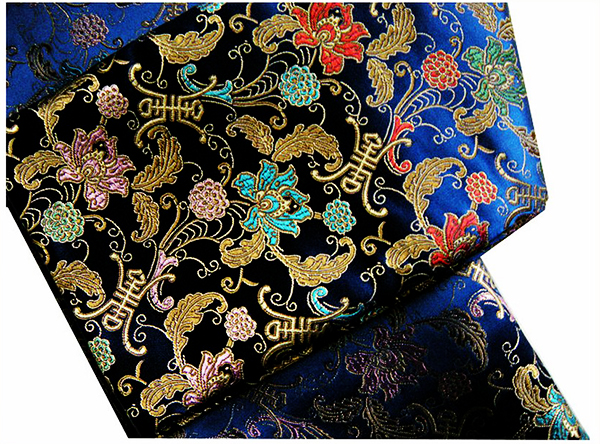Nanjing Yunjin

History
NanjingYunjin refers to the incredibly beautiful brocade made in Nanjing, capital city of eastern Jiangsu Province.Yunin Chinese means clouds, and jin means brocade. The image is lovely: A delicate and flossy piece of brocade that feels just like soft clouds.
The history of Nanjing Yunjin can be traced back to thethree kingdoms period(220-280). In a war, which broke out at the end the East Jin Dynasty (317-420), General Liu Yu defeated theXi'an-based Later Qin kingdom (384-417). The victory brought all the craftsmen in Xi'an back to Jiankang, now Nanjing City, among whom brocade-weavers were a dominant force. The brocade weavers were top craftsmen nationwide and had learned lots of skills from minority ethnic groups. The East Jin government had set up a special brocade office in Nanjing to manage the production of the brocade, which represented the formal establishment of Nanjing brocade.
Later in the Yuan Dynasty(1279-1368), Mongolians conquered Central China and the rulers then defined a tradition of decorating officer's dress with shining gold and silver. With the flourishing and exploitation of gold mines, weavers added real gold thread into Nanjing brocade. The shining brocade immediately won great favor of feudal kings and aristocrats and also was popular among ethnic minorities such as Mongolians, Tibetans and Uygurs. In the Yuan, Ming (1368-1644) and Qing (1644-1911) dynasties, rulers set up official special fabrics bureaus in Nanjing for the administration and monopoly of the brocade production and marketing. They listed it as one of the special royal tributes to emperors. Brocade technology was repeatedly refined despite high costs both in terms of time consumed and materials used. It was not long before the brocade surpassed the other famous silk products, and it obtained fame as a silk fabric with the greatest rarity and high technology.
In the middle of the Qing Dynasty, the boom in the production of the brocade reached its climax. In the numerous fabrics trading households along theQinhuai Riverin Nanjing, weaving could be heard as it echoed day and night and an unprecedented outcome in brocade production was enjoyed. Records say that more than 30,000 looms were involved in brocade production and 300,000 people made a living on it.
Technique
An inch of the Nanjing brocade was said to be as valuable as an ounce of gold. What is amazing is that the delicate and soft brocade came out from wooden looms as big as 5.6-meters long, 4-meters high and 1.4-meters wide. The huge looms needed two operators, one above and one below in the delicate production sequence that was as complicated as a current computer programming language. The process showed the incredible talent of Chinese of the past. The person sitting at the loom was known as a "thread puller". All he or she had to do was to pull the thread in line in the threading sequence, corresponding to commands entered into a computer keyboard of today. The person sitting on the lower part of the loom was called a "weaver". He or she twined the pattern and wove the materials into brocade using golden or multicolored threads. The woven piece in front of the weaver was just like a computer screen. The weaving technology of the brocade is exceedingly complex and exquisite, and no modern machine has yet been able to replace the ancient looms.
There are mainly four categories in brocade: gold weaving, (in which gold is pressed into foil, then cut into thread-like pieces to be twisted into threads and then woven on looms) Ku Silk Fabrics, Ku Brocade Fabrics and Zhuanghua Silk Fabrics. All four categories serve as materials for emperors' robes, queens' dresses and shawls, concubine's clothing, decorations for the imperial courts and daily use articles, including cushions, mattresses, pillows, and quilts. The Nanjing brocade served as precious gifts for emperors to give to foreign kings and ministers.
